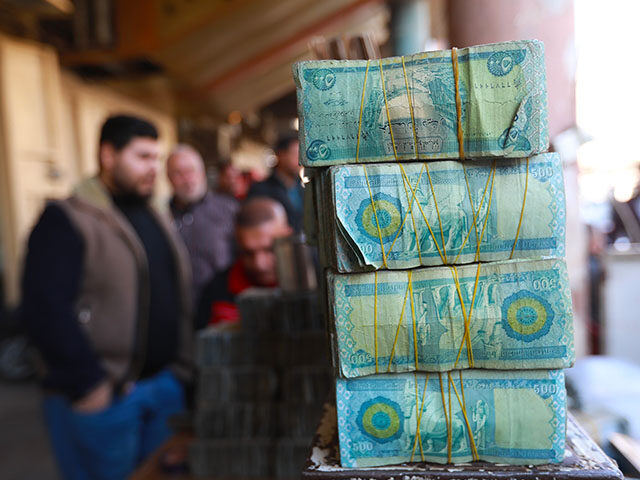Mazen Ahmed, director of investments and remittances at the Central Bank of Iraq (CBI), said on Thursday that cash withdrawals and transactions using U.S. dollars will be banned effective January 1, 2024.
The measure is ostensibly intended to crack down on abuse of Iraq’s hard currency reserves, including the use of Iraq’s dollar supply to evade U.S. sanctions on Iran.
Ahmed said the new rules will stipulate that dollars deposited before January 1 can still be withdrawn in dollars, but dollars deposited afterward can only be withdrawn in Iraqi dinars, which are currently trading at 1,320 to the dollar according to CBI’s official rates.
“You want to transfer? Transfer. You want a card in dollars? Here you go, you can use the card inside Iraq at the official rate, or if you want to withdraw cash, you can at the official rate in dinars. But don’t talk to me about cash dollars anymore,” Ahmed told Reuters. CBI later clarified that only account transfers into Iraq from other countries would be subjected to these restrictions.
There are two major problems with Iraq’s dollar reserves. The first is that Iraqis have a predilection for using dollars whenever possible because they lack faith in the stability of Iraq’s banking system and currency.
Heavy dollar transactions have left Iraq’s banks short of U.S. currency, a problem the banks made worse for themselves by issuing loans in dollars to please their customers but accepting repayment in dinars.
This dollar shortage means the real-world or “parallel” exchange rate for dinars to dollars is considerably higher than CBI’s rate. The parallel rate is about 1,700 dinars to the dollar at present, a figure Ahmed mocked as though he were disproving a fairy tale.
“We don’t have a problem with the exchange rate hitting 1,700. If they tell me the rate is 1,700, I tell them: ‘You want to import from Iran. You want to smuggle. You have corrupt money that you want to get out,’” he said.
Ahmed was alluding to the use of Iraq’s imported U.S. dollars to facilitate illicit commerce with Iran, a problem that has grown so severe that when Iraq asked for another billion dollars in cash from the Federal Reserve Bank of New York this week, the U.S. Treasury Department said no.
The refusal angered Iraqi officials, who blamed the U.S. for creating a dollar shortage in Iraq by announcing restrictions, which panicked Iraqis into buying and hoarding dollars, further reducing the money supply.
CBI desperately wants to increase the value of the dinar, but dollar shortages and hoarding of American cash keep pushing its value down. Iraqi officials argued that without the extra billion greenbacks the U.S. refused to provide, the central bank lacks the resources it needs to “control the ups and downs of the market.”
American dollars have proven useful for money laundering operations, and exceptionally useful for doing business illegally with Iran, which in turn funds Shiite militias in Iraq that exert Tehran’s political will upon the Iraqi population. Some Iraqis also allegedly do business with sanctioned entities in Syria and Lebanon using dollars.
The Iraqi people are not happy with their government’s effort to shore up the dinar and de-dollarize the economy. Reuters described a viral video that showed an angry Baghdad depositor threatening to burn the bank down if he was not given his money back in dollars, an uncomfortable echo of consumer rage during the far worse financial crisis gripping Lebanon.
A Baghdad journalist employed by an American company told the National on Thursday that she has been unable to obtain her salary in dollars since August, even though her employer transmits her paychecks in U.S. currency.
“Every time I go, they say the Central Bank of Iraq is not giving us enough dollars to pay for customers. They say, ‘We can only pay you in Iraqi dinars considering the official exchange rate,’” she said, noting that the official rate is far below the real market or “parallel” rate, so she is effectively losing a fifth of her pay.
“After many attempts, they offered paying me only a quarter of my salary in dollars and the rest in Iraqi dinars, but I refused,” she said.
The Baghdad journalists said Iraqis feel this situation is “unfair” because honest people are being punished for “the thefts and smuggling of the hard currency others do.”
Markets Insider warned on Friday the trend toward de-dollarization could mean big trouble for the U.S. economy down the road because it could undermine America’s “dominant role in international trade.”
Russia and China are certainly hoping so, as they are both making major efforts to strip the dollar of its dominance. Both of those hostile authoritarian regimes pressure their trading partners to settle transactions with their own currencies, and together they dominate BRICS, a bloc of developing nations that aspires to create its own powerful currency.
Iraq Prime Minister Mohammed Shia al-Sudani announced this week that he will travel to Moscow for meetings with Russian President Vladimir Putin and other top officials on October 10-11. Iraqi state media said greater economic cooperation with Russia would be on Sudani’s agenda.

COMMENTS
Please let us know if you're having issues with commenting.